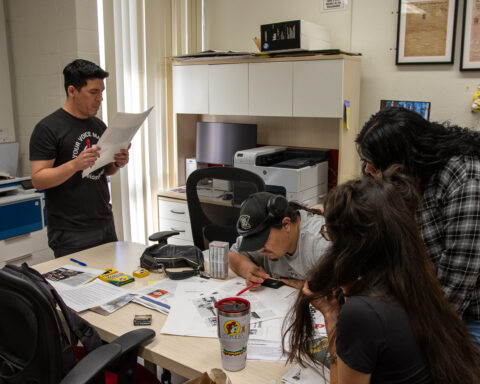
California cultivators can now produce their own homegrown marijuana plants, following the passage of Proposition 64 in 2016. Under the Adult Use of Marijuana Act, individuals 21 years or older can cultivate up to 6 mature plants or twelve immature plants under 24 inches high in a single residence.
Santa Ana City Council stated late 2016 that the city prohibits outdoor cultivation operations within the city and requests personal cultivators to apply for residential cultivation permits.
Growers must confine their marijuana plants to a designated indoor location or an outdoor area that is clear from visible sight. Cultivation limits remain the same for medicinal marijuana patients, unless approved by a qualified medical physician or staff.
“There is really no easy way to hide an outdoor grow, and if Santa Ana does not permit it, then it should not even be an explorable option for growers,” said 55 Hydroponics employee, Brandon Fiore.
All cultivation permits and oversight occurs under the Federal Drug Administration, working under the guide of CalCannabis Cultivation Licensing, which has issued about 3400 temporary permits to interested patrons wishing to distribute and grow in large-scale operations or projects.
“All commercial cannabis farmers must have a state-issued temporary or annual cannabis cultivation license,” said CalCannabis Cultivation Licensing Communications Manager Rebecca Foree. “Temporary licenses are valid for 120 days and the annual licenses must be renewed every year.”
On April 17, city council members voted to adjust legislation regarding commercial marijuana cultivation, manufacturing and distribution to avoid outsourcing outside entities. Currently, the California Department of Food and Agriculture has not issued any temporary licenses to Santa Ana, since the city originally banned commercial growth in response to AUMA.
Alongside personal and commercial marijuana growth, current and former cultivation offenders can seek legal relief from their infractions following the law’s leniency and opportunity to remove old charges.
California growers cultivating more than six plants without proper permits can be charged with a misdemeanor or a fine up to $500. Individuals under 21 years old caught cultivating will be charged with an infraction.
Growing-related offenses prior to Jan. 1 can be dropped if the offense follows the guidelines outlined in Prop. 64. Charges remain for individuals with multiple violent felonies, two or more cultivation-related offenses for growing six or more plants illegally or registered sex offenders.
As one plans for personal or commercial cultivation, individuals should educate themselves on their city’s laws and regulations and information on marijuana gardening and supplies.
The CDFA offers training courses to educate people about marijuana cultivation, challenging the plant’s lasting stigma despite recent legalization and changing culture.
“The CDFA is working hard to educate the public about the cannabis regulations by offering licensing workshops across the state and by providing numerous handouts,” Foree said.
Hydroponics stores provide supplies for organic plant gardening, such as fertilizer, plant-safe pesticides and hoses, to promote healthy fruit, vegetable, flower and marijuana growth.
The requirements for a successful indoor grow includes additive-free solid, filtered or bottled water, a heat lamp and proper air filtration to mimic outdoor settings. Growers should also shield the plant from the lamp’s harsh 1000 watt rays with an air conditioning unit or fan.
“If you keep your grow simple and provide the right soil, it is very easy to keep a grow alive,” Fiore said.
- Landscape and Garden Tour of the New Central Mall - June 1, 2019
- Subculture Party Brings Rave Culture to DTSA - May 9, 2019
- California Needs to Lower Its Outrageous Gas Prices - May 3, 2019













